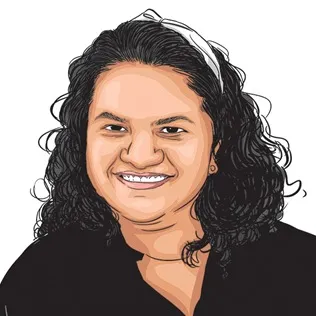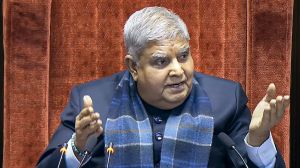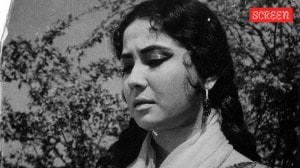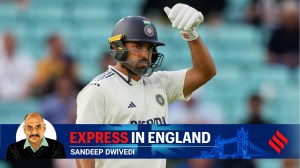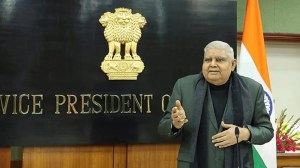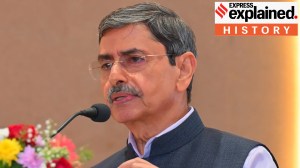Click here to follow Screen Digital on YouTube and stay updated with the latest from the world of cinema.
Of monsters and more: A deep dive into LGBTQ+ narratives in Malayalam cinema
Despite engaging meaningfully with issues like patriarchy and casteism in recent years, Malayalam cinema has not had the best track record with LGBTQ+ narratives.
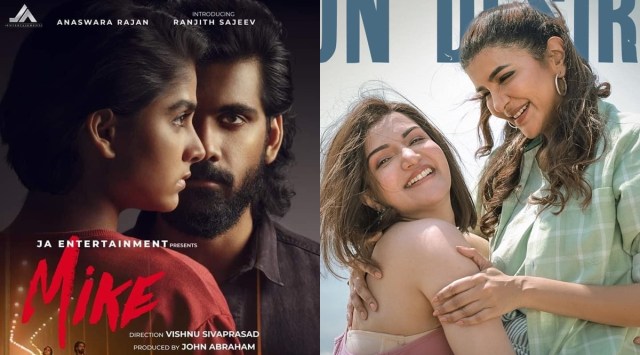 Stills from Mike and Monster.
Stills from Mike and Monster. The year 2022 saw the release of two Malayalam movies based on LGBTQ+ narratives. One was Monster, starring Mohanlal, who is arguably one of the biggest stars of Mollywood, as well as a critically acclaimed actor with a legacy spanning more than four decades. The other was Mike, a relatively small-budget film, which was produced by Bollywood actor John Abraham, his debut as a producer in Malayalam cinema.
Monster was a crime thriller with Mohanlal playing an undercover cop on the trail of what he describes as the “biggest insurance fraud in history”. His investigation leads him to Kerala, to a family comprising of a married couple, their daughter, and her caretaker. Mike, meanwhile, deals with a tomboy-ish character Sarah (Anaswara Rajan), who wants to get a gender-reassignment surgery. Her journey after meeting Antony (Ranjith Sajeev), a dispirited young man, is the focus of the film.
The critical and audience reception to both movies was largely negative– both films were considered regressive when it came to gender identity and depiction of queer characters, albeit in different ways. Monster portrayed the two lesbian characters as villains, playing to an old trope where queer people are inevitably shown as anti-social elements, and even though on the surface it looked as if Mike would challenge the concept of gender, it ended up re-affirming the norms associated with it.
Malayalam cinema, for a long time, has been associated with more experimental and progressive movies, that go beyond the traditional narratives surrounding social issues. In the past few years, movies like The Great Indian Kitchen (2021), Jaya Jaya Jaya Jaya Hey (2022), Nna Thaan Case Koodu (2022), Kumbalangi Nights (2018), Sudani from Nigeria (2018), Take Off (2017), among others, have earned audience and critical appreciation from beyond Kerala, making the industry cement its position as a reliable producer of movies that tackle difficult subjects in an effective way.
However, despite engaging meaningfully with issues like patriarchy and casteism in recent years, Malayalam cinema has not had the best track record with LGBTQ+ narratives. While the alternative, or ‘indie’ sphere in Mollywood has seen some progressive voices like Ligy J Pullapally’s Sancharram (2004) and more recently, Geetu Mohandas’ Moothon (2019), they have been few and far in between, while the mainstream has either ignored LGBTQ+ voices completely, or worse, used them as comic relief or in negative shades.
To be fair, Moothon received widespread critical acclaim. It premiered at the 2019 Toronto International Film Festival before releasing commercially in India. It can’t be denied though, that in the larger cultural context, a film like Moothon seems to be an exception than the norm.
A short history of LGBTQ+ narratives in Malayalam cinema
The first Malayalam film to hint at lesbian attraction came out in 1978: Randu Penkuttikkal, which was directed by Mohan, and based on V T Nandakumar’s novel of the same name. Jayan K Cherian, a US-based Malayalam poet and filmmaker, whose 2016 film Ka Bodyscapes explored themes of gender fluidity and homosexuality, described Nandakumar’s novel and its film version as being “hetero-centric” and a “supplementary pleasure for the male gaze”.
“Today also, same-sex love centered around female bodies is more acceptable, because it caters to and fits in with the male gaze,” he told indianexpress.com.
Eight years later, another movie came that hinted at lesbian intimacy. Celebrated director P Padmarajan’s Deshadanakkili Karayarilla (1986) told the story of two school girls who decided to run away together, convinced of their non-conformity in the conventional settings of their home and school. Despite never outrightly naming the relation between the two girls, the film gave enough hints to point at a non-heterosexual bond. However, it couldn’t rid itself of certain clichés, like one of the girls becoming infatuated with a man (played by Mohanlal), in order to make it more palatable to the society it was set in.
Speaking to indianexpress.com, director Jubith Namradath, who directed Aabhasam (2018), one of the few Indian movies to cast a transgender actor in a trans role, said about Deshadanakkili Karayarilla: “We can’t unsee the masquerade of bringing in unwanted characters and plot lines to give it the normalised look, primarily due to the commercial audience it catered to.”
The film also ultimately chose to kill off the two girls— this is an example of ‘bury your gays’, a literary trope in which one or both partners in a same-gender couple die. This trope has been used by authors and filmmakers across generations and industries to avoid being attacked for portraying queer love, especially in a way that makes it appear normal or acceptable.
Later, Lal Jose’s Chanthupottu came out in 2005, starring Dileep as a man brought up as a girl by his grandmother. It became a major blockbuster; however, the impact it had culturally was far more significant. According to Namradath, the film tried to “paint a male chauvinistic narrative” of what it meant to be a trans woman in society. He added that abuses and violence directed at trans individuals “only increased with the film as it gave more scope and ideas on how to abuse”.
Queer rights activists from Kerala have also talked about the film’s anti-trans legacy, since it builds up a clear distinction between what it means to be a man and a woman, and uses effeminate characteristics as vehicles of ridicule. Lal Jose refuted all criticism of the film in a 2019 interview, saying that “there was no gender issue in the film”.
It is only with the ‘New Wave’ in Malayalam cinema, which started sometime in the 2010s, that things started changing for queer stories in Malayalam cinema. Before the success of Moothon, the industry saw Rosshan Andrrews’ psychological thriller Mumbai Police (2013), which was a rare instance of a major film star, Prithviraj, playing a gay role, that too as a cop. Another example is Njan Marykutty (2018), directed by Ranjith Shankar, starring Jayasurya (a cis male actor) as the trans-woman Marykutty.
On his choice to cast transgender activist Sheetal Shyam in his film, Namradath said, “It was for the first time that a trans person was cast as a trans person, and that’s a political and cinematic statement. I believe in giving them their roles. This also helps a filmmaker to shed inhibitions, if any. As we work through the script and discuss with actors, a queer person can shed more light on how someone from the community would behave or be treated, unlike an outsider assuming the same.”
Back to 2022
Change has been slow, but noticeable in Malayalam cinema, when it comes to the depiction of queer lives and experiences, over the last couple of years. However, when seen together, both Mike and Monster seem to be dragging the conversation backwards, in their own ways.
While Mike presents itself as a film trying to break apart the biological essentialism (the belief that biological influences come before cultural ones and set predetermined limits) of gender norms, it ends up making a mockery of the same. This it accomplishes through a heterosexual romantic encounter: it is implied that the protagonist chooses not to go through gender re-assignment surgery because of this. Moreover, the question of gender is made subservient to the reformation arc of the love interest, who is shown to be on a path of self-destruction prior to meeting the protagonist.
Monster, with its lesbian villains, displayed a complete lack of understanding of the trauma faced by same-sex couples in the country. By showing that the women turn to crime (fraud, murder, etc) after being publicly humiliated, the film attempts to gaslight the audience into believing, somehow, that they deserved their tragic end. Mohanlal, as the undercover cop, delivers a lengthy monologue about how India can assure justice for people “like them” and how “things have changed”.
Cherian says that it has become “fashionable and marketable” for filmmakers to include LGBTQ+ themes in their movies now, leading to a surface-level engagement with them, instead of a deeper exploration. He adds that despite a lot more “visual expression of same-sex love evolving across industries”, there is still a tendency for them to be centered around the male gaze, which has dominated art for centuries.
Namradath says that the scope to explore LGBTQ+ narratives in Malayalam cinema is “unlimited”. He adds, “The prejudice of marking queer narratives as ‘parallel’ or ‘indie’ should change. Why can’t they be ‘mainstream’? Don’t queer people live and share this world with us? Why the urge to regard such narratives as parallel?”
He also says that more queer people need to be encouraged in creative spaces. “Not just in acting, but in the writing and directing departments as well. This, I believe, will open up how a mainstream story could be narrated with queer characters in it,” he says.


Photos
- 01
- 02
- 03
- 04
- 05


